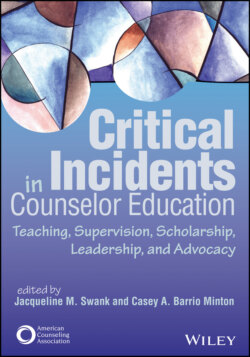Читать книгу Critical Incidents in Counselor Education - Группа авторов - Страница 37
Steps After Plagiarism
ОглавлениеEven the very best writers may misstep with regard to academic integrity and plagiarism. In addition to educating students, counselor educators must challenge themselves to follow five recommendations for discussing and assessing student work around plagiarism.
First, educators should keep reading and studying. Professor P was able to catch that the assignment was plagiarized because they were familiar with the author and the article. There is nothing wrong with having go-to articles, books, and authors, but counselor educators need to continue feeding their minds in the same way they encourage students to learn and grow.
Second, faculty members may use free-write assignments in class and have students hand them in before the first big assignment. The free-write assignments allow counselor educators to learn about students and their writing styles. They also allow students to hone their creativity around an assignment. Through free-write assignments, students can build depth by forming their own ideas prior to the due date. A student who is crunched for time may inadvertently copy an idea from another source because their memory is pulling information from documents, audios, or programs they have reviewed. This type of plagiarism is connected to something called cryptomnesia (Dow, 2015). Although it is controversial, there have been discussions on inadvertent plagiarism through memory in extremely public cases, in particular around music (Yin, 2016).
Third, instructors should be thorough while grading and openly discuss the grading process. This includes making an active decision not to skim student assignments. In addition to being able to fully hear what students are saying in their submissions, reading the entirety of students’ work is an act of respect for the work they do. As counselor educators become more familiar with students’ styles, it becomes easier to distinguish whether they are using their voice. Openly discussing the grading process may encourage students to be mindful of their work while reassuring them that the instructor is being thoughtful about the care they are putting into the grading process.
Fourth, instructors should have students submit large assignments online. Grading online allows counselor educators the opportunity to hear the assignment through text-to-speech software. By listening this way first and then cycling back to read through on their own, counselor educators can hear an assignment in its entirety without the stop-and-go of marking. Counselor educators may use text-to-speech software so they do not become fatigued from reading each document twice. Often as we pause our reading while grading tone, mood, and flow can be disrupted, which can change the voice intended by the student.
Fifth, counselor educators should use a plagiarism detection program. Many university learning management systems provide screening programs such as SafeAssign or Turnitin. These programs provide a percent count of original student content to content likely written by someone else. These works can include published professional works or previously submitted student works.
